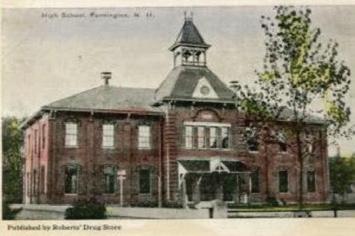
4 minute read
A Little History of Farmington, New Hampshire
Farmington is home to Blue Job State Forest, the Tebbetts Hill Reservation, and Baxter Lake. It also happens to be home the world’s longest sled. Within Farmington’s total area of 37.5 square miles is a blend of small workforce housing, multi-unit properties to large multi million dollar estates, small mom and pop stores, some manufacturing and small to large farms including the much visited pick-your-own fruit Butternut Farm.
The native Abenaki people called the area Chemung, meaning “canoe place”, where they built the many birch bark canoes used for transportation on the three rivers—the Cocheco, the Ela, and the Mad River. Otherwise, the river valley was wilderness, through which the native peoples from the north traveled to and from Lake Winnipesaukee on their way to other areas and hunting grounds.
Farmington began as the Northwest Parish of Rochester chartered in 1722. The first town meeting was held on March 11, 1799 at the home of Simon Dame. The 141 voters present elected three selectmen: To this day, this form of government has been maintained, with the addition of a town administrator,
With about 1,000 inhabitants, Farmington was incorporated in 1800 with a vote of 125, a 40 X 50 foot two-story meetinghouse was erected on Meetinghouse Hill. The same year, John Wingate established a black smithy. He would also become proprietor of Wingate’s Tavern.
Farmington began as an agricultural community, and In the 19th century developed a prime shoe making industry, and was one of the first places to use machines to automate making shoes instead of all by hand.

The Civil War created a lot of demand for business. In 1836, E. H. Badger built the first shoe manufacturing shop on Spring Street Later Martin Luther Hayes took over the business, and by 1840 was successful enough to enlarge the building. The last factory was the Alton Shoe Company until 1991. The town would be connected by railroad to Dover in 1849, the line extended to Alton Bay in 1851. Shoes were shipped to Boston to be sold at semi-annual auctions for 50 cents a pair.
It was as a cobbler who was one of the most renowned native, Vice President Henry Wilson.
Rivers and Lakes and Mountains
The highest point in Farmington is the Blue Job Mountain, 1,350 feet above sea level. There is a fire tower at the summit, and many trails within the 284 acre Blue Job Mountain State

Forest. It is a sanctuary for nature and nature lovers alike.
Farmington lies almost fully within the Piscataqua River (Coastal) watershed, with the westernmost corner of town located in the Merrimack River watershed.
Baxter Lake is the largest body of water, a 302 acre warm water lake that holds previous state records for the largest bass and teaming with all kinds of native fish.
Farmington is centrally located near the best that New Hampshire and Mother Nature can provide. To the west is the Lakes Region including Lake Winnipesaukee Portsmouth and the Atlantic ocean to the south Conway and the White Mountains to the North.

Farmington is home to modest housing and magnificent waterfront estates.
This is a town that has stood the test of time through good times and bad. It endures as a quintessential New England town with the historical buildings intact while many of the original structures retained and renovated without losing its charm. There are modern amenities including parks, a golf course while being so close to everything you need yet far enough away from the hustle and bustle of any busy city. It is a commuters location and close to all the things people want to go and enjoy the good life only New Hampshire can provide. A great place to call home.



